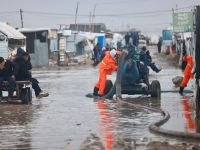Morocco is waging a campaign against corruption, with courts reviewing several cases involving senior officials of state-owned enterprises suspected of embezzling millions of dollars.
The Special Court of Justice is currently debating the case of Rachid Haddaoui, former director general of the Credit Agricol (Farmers' Bank). Haddaoui and his accomplices are accused of striking fraudulent deals.
The authorities last week reportedly arrested a renowned businessman, Mohamed Feggane, who is accused of skimming $300 million from the Casablanca-based real estate bank, Credit Hotelier et Immobilier.
The businessman, who has lived in France since his case was unveiled in 1997, was arrested upon returning to Morocco and placed in custody pending trial. A Casablanca court already has sentenced two people involved in Feggane's case to 20 years in jail.
The fight against corruption has also touched sports.
The government has hired an international audit company, PriceWaterhouse, to revise the Moroccan Athletics Federation's financial situation and dealings.
The Moroccan media had denounced "blatant'' acts of fraud within the federation, formerly headed by former head of Royal Security, Haj Mohamed Madiouri. Madiouri resigned recently as head of the athletics federation.
Corruption has reached such an extent that the government of socialist Prime Minister Abderrahmane Youssoufi vowed to make it a top priority.
"The reform of the vital sectors of justice and administration and the consolidation of the respect of ethics in public affairs top the agenda of the government", Abderrahmane Youssoufi, who leads a center-left coalition government, said recently.
However, some are skeptical about the planned reforms, especially in the judicial sector, where corruption is seen as rampant.
Moussa El-Wali, a clerk at the Casablanca court of first instance for 28 years, is one of these.
"I believe that the reforms and the cleansing they are talking about are farfetched. Corruption is now commonplace and propagated among almost all justice executives", he said. "Court agents in charge of implementing rulings deliberately toughen administrative procedures for those who refuse to pay." Aicha Kinane, an intern lawyer, lashes out at the emergence of a group of attorneys "who form a real mafia specialized in insurance and work accident cases".
"These lawyers have agents in courts who help them in the hunt for victims,'' she said. ``They conceal court rulings, give false dates for sessions and resort to all means to prevent people from attending the sessions concerning their cases in order to skim the compensations.'' In a public awareness drive, the non-governmental organization "Transparency Maroc" drew support from 35 other civil society associations to encourage the government "to find a cure to this cancer that saps all development efforts in Morocco.'' But the campaign is seen as not enough to battle embedded corruption.
"We have been living with corruption for years. It has become a fait accompli for practically all components of the society", said Mohammed Kharif, a Rabat-based sociologist.
Kharif cites a 1988 study of the U.N. Development Program that puts Morocco 36th out of 52 countries where corruption and lack of transparency still prevail.
This corruption, lack of transparency and excessive bureaucracy are always cited among the main obstacles hindering the flow of foreign investments into Morocco.
Mourad Sharabi, who owns a garment factory in Casablanca, concedes that Morocco's reputation makes foreign investors shy away from conducting business in this North African country of 29 million people.
``A foreign investor would never accept to waste his time trying to find a way out of the labyrinths of our bureaucracy and would not venture to sacrifice parts of his capital in bribes to have his dossier approved by corrupt executives," Sharabi said.
The local press reported a Saudi businessman as saying "Morocco offers good investment opportunities. But some executives, especially in the investments and industrial administrations, push away foreign investors who fear falling into the trap of deliberate administrative procrastination and bureaucracy.'' Noureddine Shaoush, a law school professor in Casablanca and member of "Transparency Maroc,'' said "amending the existing laws in such a way to make them tougher in dealing with guilty executives is one way of curbing the plague.'' Under a 1965 law, corruption and bribery cases involving state executives, fall under the prerogatives of the Cour Speciale De Justice (Special Court of Justice).
The laws on corruption were amended in 1980. Under the new provisions, only cases in which the skimmed funds or the money given in bribe exceed 25,000 dh (nearly $2,500), shall be considered corruption cases. –(Albawaba-MEBG)
© 2000 Mena Report (www.menareport.com)







